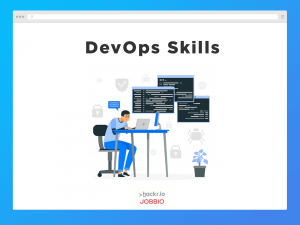If you are a software developer, you probably know how hard it is sometimes to coordinate your team’s efforts in a way that will produce the best results. Moreover, it is quite difficult to cooperate with IT teams too. However, there is a solution to this problem.
DevOps has been around for a decade now and has saved many IT and software development teams from failing. If you want to grow as a developer and want to improve your work style, you should start implementing DevOps into your business as soon as possible.
What is DevOps?
DevOps is a combination of development and information-technology operations. This is where the “Dev” and the “Ops” come from. Basically, it’s a set of practices that allows for the processes between IT teams and software development to be automated.
DevOps enables IT teams to build and test software much faster and make such programs more reliable. The idea or aim behind DevOps is to create an environment for teams that worked separately which will allow them to collaborate effectively.
The results of using DevOps in your business are said to be quite impressive. For instance, you can improve trust, release software faster, manage unplanned work, and solve critical problems quickly. All of these are truly valuable to any type of business.
You could say that DevOps is not just a group of practices but also a culture and a movement, maybe even a philosophy or a workstyle. It requires changing your mindset in order to fully understand and use these techniques for collaboration and integration.
To understand what DevOps is, it’s necessary to look at its history. The movement started between 2008 and 2008. Back then, IT specialists and software developers had realized that there was a problem affecting both of their communities that had to be addressed.
The traditional software development model had to be changed or substituted completely. Before, those who wrote the code would act separately from those who deployed and supported that code. Developers and IT specialists would do everything with no communication between the two. However, this was about to change.
Such pioneers like John Willis and Gene Kim were at the head of the conversation. Everything started with online discussions and grew into a major movement in the industry. You will need to take small, measured steps to implement DevOps into your strategy, but eventually your software development and IT teams will work better together.
What are the benefits of DevOps?
So, why is DevOps so important and how can you benefit from it? As mentioned above, there are several advantages to these practices. Let’s look into each of them:
Collaboration Between Teams
The biggest advantage of DevOps is the culture it allows to build, an environment in which teams thrive as they work together. The trust and shared responsibilities are remarkable and allow for better communication and understanding. Specialists are able to get faster and better feedback which enables them to update and upgrade the product more efficiently. A major part of DevOps is the “systems thinking” mentality which means being aware of how your actions affect both your team and all other teams that are a part of the project.
Faster Product Releases
Teams that have adopted the practices of DevOps work much faster and display more high-quality and stable performance. These specialists understand that they have the same priorities which means that they can plan their work more effectively. It’s about abandoning the “not my problem” thinking and adopting more progressive ideas. DevOps also takes into account automation which can simplify many tasks and improve team productivity and in turn confidence.
Accelerated Workflow
Faster release dates are just the result of an accelerated workflow. All the processes become transparent and clear as there is enough communication brought by the DevOps practices. Moreover, teams will be able to minimize downtime getting back to work as soon as possible. All of this is directly related to customer satisfaction which is also fundamental for the image and good reputation of your business.
Readiness for Unexpected Work
Managing unplanned work is essential for the well-being of your business. Unexpected tasks are directly related to the productivity and performance of your team, so you must be able to manage them effectively. With more communication between different teams, you will be more likely to anticipate and prepare for unexpected obstacles or challenges on your way.
DevOps Beginners to Advanced | Decoding DevOps with Projects
Who is a DevOps professional?
DevOps professionals are also often called DevOps engineers. They work with IT developers to coordinate teams and make sure that all the aspects of the project are taken care of. DevOps is about creating a tighter relationship between IT operations and businesses, and DevOps professionals are the ones in charge of it.
For example, there may be problems in communication between the IT and software development teams if someone doesn’t speak English. A good DevOps professional will solve this problem with the help of an online translation agency, in another way by translating important documents and emails.
Successful and certified DevOps professionals are the ones that possess both technical and non-technical skills. These specialists use the resources available to them to validate and monitor the performance of other employees.
As mentioned earlier, coding is a huge part of DevOps, which means that professionals working in DevOps need to have at least a minimal knowledge of coding. They may not be the ones doing the coding from scratch, but it’s still important. Here are some other tasks DevOps engineers perform regularly:
- Connecting the production infrastructure and the operating system with various elements of coding, software development kits, libraries, and more. This is necessary for running software releases.
- Understanding the basics of software development languages as well as being familiar with the tools used for developing and creating new code or updating the existing one. This is due to the constant changes that DevOps requires.
- Working with development staff to manage the coding and scripting for connecting elements of the code including libraries, software development kits (SDKs), and so on. These are also needed to run the software releases.
- Managing the IT infrastructure depending on the supported software code. This is done so that there is a provision for resources and in order to get a specific deployment model, validate the release, and monitor performance.
- Knowing the various computer programming languages and scripting languages in order to work with a variety of open-source tools and technologies used for managing source codes.
- Connecting to business and technical goals actively and exhibiting good communication skills in order to adapt and evolve according to the latest tendencies in the industry. The software your teams create must me the requirements of the current world.
What are the skills DevOps professionals must have?
In order to be able to complete all the necessary tasks, there are some crucial skills every DevOps professional must possess. Here are the main ones:
1. System Administration
Being an excellent Sysadmin is essential for building, managing, and troubleshooting servers regularly. Perhaps, it’s the most important aspect of being a DevOps professional.
2. Virtualization
Every DevOps professional will have to be virtualizing servers and various other components. This is why you must be skilled virtualization or at least somewhat acquainted with it.
3. Soft Skills
Along with coding, soft skills are the ones that “build” the bridge between IT and software development for you to use. Combined with people skills, soft skills will ensure that you maintain a steady pace when coordinating teams.
4. Coding
Coding is one of those things that you need to have at least a basic knowledge of. You will be able to direct IT and software development teams much better. Even after most processes are automated, coding will still be required.
5. Security
The security involved with IT organization is special and needs to be taken care of at all times. You must make sure that the system is safe, and all the necessary measures have been taken so that it runs smoothly.
6. Testing Knowledge
To develop great software, it should be tested and delivered properly. This is why having testing knowledge is so important for DevOps professionals. You need to make sure that the testing is going in the right direction.
7. Automation Knowledge
There are many automation tools right at your disposal, so you need to understand how they work and how to use them. You have to be familiar with such tools to use them properly and make workflow easier.
8. Network and Storage Experience
Having experience in network and storage is a must for any DevOps professional. This is because such specialists will need to design solutions that will take into account performance, scalability, and availability at all times.
Click here to Read:
What are the DevOps tools you can use?
There are some amazing DevOps tools you can use if you want to start implementing these practices. It’s not a complete list, but it will be enough to get you started:
- Git/GitHub: For source code management and version control system.
- Docker: For software containerization.
- Chef: For configuration management.
- Selenium: For automated testing.
- Jenkins: For developing CI/CD pipelines and server automation.
- AWS: For cloud platform integration.
What is the takeaway?
Firstly, DevOps allows you to develop a culture and environment where collaboration is key. Cross-functional collaboration is at the core of DevOps and teams benefit greatly from such work environment and constant communication.
It doesn’t matter how many tools you use to automate your business processes – if they aren’t used with DevOps, they will be virtually useless. The principles and practices of DevOps do not solve tooling problems but rather human problems.
Product- and project-oriented teams replace function-based teams in order to develop and grow over themselves. By having a plan to reach a single aim, IT and software development teams become way more efficient too and encourage collaboration.
Secondly, DevOps works closely with automation meaning that all of the business processes will become much easier once you adopt the practices of DevOps. Repetitive manual work is eliminated while repeatable processes are perfected.
For the teams who don’t have automation in place already, test and deploy automation are a great starting point. Everyone benefits from automatized systems that take care of developing, testing, and operating work.
Teams that are only starting out with automation can benefit from the practice of continuous delivery where you have to run each code change through some automated tests facilitated by cloud-based infrastructures. After that, successful builds are packaged up and promoted towards production by using automated deploys. It’s not quick or easy, but the ROI is totally worth it.
Lastly, DevOps allows you to embrace failure and improve continuously. It’s about being agile and keeping up with the ever-changing world. Taking opportunities when you come across them has never been so important.
DevOps also ensures that you have the right data to assess your performance and see whether you are really improving. There are dozens of tools and technologies that help you measure anything from how many sales your blog post generated to how often users get notifications from your software.
Final Thoughts
In conclusion, DevOps is already aiding many businesses all around the world, so if you want to join their ranks then it means you are willing to evolve. Follow the tips in this article to plan your strategy and hire or become a DevOps professional.
People are also reading:

![7 Best AI Coding Assistants In 2023 [Free + Paid]](jpg/16952882603blllo1oza.jpg)
![30 Cool, Easy & Fun Python Projects + Source Code [2023]](png/1655865129yuz5v1mdab.png)

![The 14 Best TensorFlow Courses in 2023 [Free + Paid]](png/1624550510xonrryd0t0.png)
![10 Best Design Books for Design Students [Updated]](png/1642872008wcnbdsvf6q.png)
![I Ranked the Top 5 Best AI Image Generators [with Image Examples]](jpg/1682848644stltm9ynp6.jpg)




